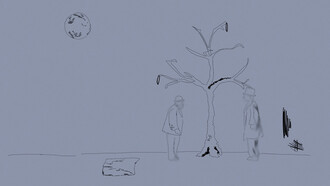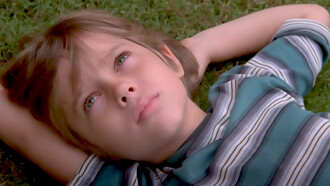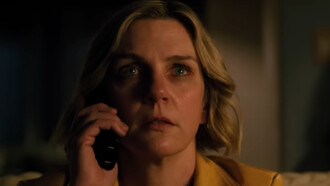You know you’re in for a night of hopeful, whimsical irony with David Byrne when you see the cover of the Playbill program. It reads American Utopia, except Utopia is written upside down.
As the crowd shuffles into the theater, you hear a recording of a large multitude of birds chirping and chattering like in a busy rainforest café for birds. Just anticipating Byrne, who has always championed nature - birds, bees, water, open space - I conjure this anthropomorphic surrealism in my mind.
The curtain rises and rock ‘n roll’s Mister Rogers is sitting at a table with an enlarged plastic human brain in his hand. He explains some of its functions, emphasizing that when babies are born all their neuro-somethings are connected. Wondrous, wide-eyed, willing, they are open to everything. In our aging process, many of those “somethings” are disconnected as we gradually succumb to routine and habit, fear and laziness and any number of other limiting emotions and thoughts which dull our nascent bliss.
From whatever planet David Byrne is visiting, contrary to his song Road to Nowhere, he has always been on the road to somewhere. He admits things are not as rosy as they could be but is, at the very least, a cautious optimist. The stage lights shine on about 20% of the audience, the amount, he says, which vote in local elections. He urges us to fulfill our civic duty because, “...important change happens at the local level” or, he offers as an aside: “Our kids are fucked.”
The Byrne band (including three women) comprises six percussionists, a bassist, guitarist, keyboardist and two singer-dancers. He expresses the sentiment to be free and unencumbered. To that end, there are no wires, cables or speakers on stage. They are barefoot, as well.
Every band member wears or carries his instrument. Often they skitter around the stage and settle in different small configurations, as in a party where people are just meeting and conversing in small groups. Sometimes, but not often, their backs are to us or they are standing sideways, seemingly playing for themselves. That is a theme Byrnes raises - how difficult it is to meet or get a reaction from people.
The two-hour celebration is carefully choreographed but somehow as loosey-goosey as Carnival in New Orleans. They are all dressed in silver-gray suits framed by three walls of silver-gray strands, through which they emerge and disappear. Yet, it is confounding because, although I don’t see any other colors, I feel them. They burst from the madcap movement and the brightness of the music.
As pliable as Gumby or Scarecrow in The Wizard of Oz, the herky-jerky Byrne is all over the stage, as are his colleagues who exude a vivacity and glow which match their considerable talents. Well, who wouldn’t be vivacious and glowing in Utopia?
Byrne brings the funk with spunk. No junk or bunk. It is a slam-dunk soirée of terrific tunes, old and new. Each song presentation is unique, either in its personnel or its staging. On one number, Byrne sings alone on stage. While his band is divided left and right behind the curtains, all you can see is their hands playing the instruments. Nothing earthshaking but quirky and effective.
A subtle subversive, Byrne explains, while he exhorts us to dance, that the fire marshal insists we don’t boogie in the aisles. Well, jeez, Byrne reasons, if there actually is a fire, wouldn’t we be able to exit faster if we were already in the aisles? You got a point there, Brother!
Eventually there is color. During the show stopping Burning Down the House, the stage is engulfed in flashing red. On the next tune, the curtains shine purple on top, green on the bottom. After 90 minutes of living on Mercury in silver gray, the inclusion of the colors is dramatic - and welcome.
Toward the end of the show, each member of the troupe buoyantly marches side by side toward the lip of the stage with a percussion instrument: cowbell, talking drum, bongos, timbales, shekere, tar, elaborate shakers, snare drum, wood block, bodhran. The jam is infectious and tribal. Byrne, the urban shaman, who once presented a multi-media show entitled Reasons to Be Cheerful, is smiling triumphantly.
Like a genie or leprechaun, even a modern-day Johnny Appleseed, Byrne, with his imaginative simplicity, showers seeds which root and promise the great human potential we all know exists. This Talking Head is a national treasure and, if he ever stops performing (which I hope he doesn’t), has my endorsement to be a future NEA (National Endowment of The Arts) administrator.















